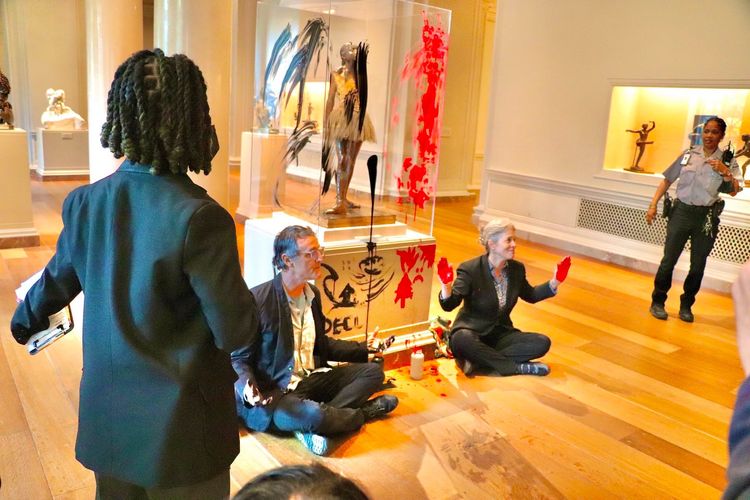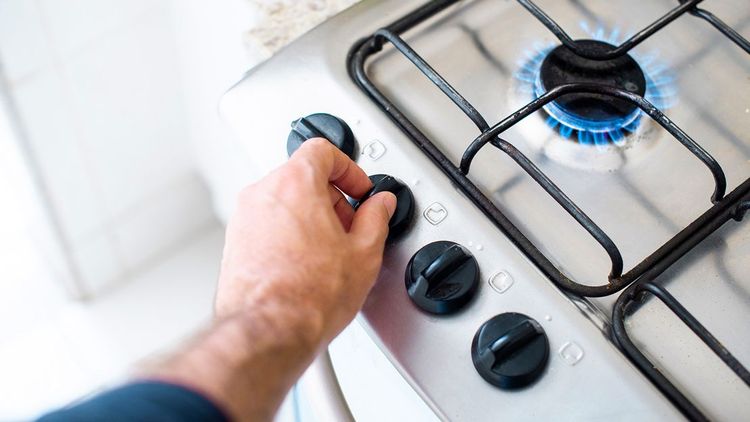What Covid and Climate Really Had in Common Was Climate Denial
Hey Hot Cakes!
We've got a podcast episode and a newsletter out today. If you're a fan of the podcast, don't forget to drop us a rating in Apple podcasts, it really helps us out! We've hit a bit of a pandemic wall recently, so will be taking the next couple of weekends off to recoup, but keep an eye out for another great podcast episode, with journalist and author Talia Lavin on the intersection of white nationalism and climate change, later this month.
Thanks, as always, for your support. It really means a lot!
Mary + Amy
What Covid and Climate Really Had in Common Was Science Denial
By Amy Westervelt
As we have often lamented at Hot Take, climate coverage fell off a cliff when Covid first took hold in the U.S.. At the same time, healthcare reporters got their first taste of what climate journalists have faced for years: they had to battle hardcore disinformation. As Pro Publica's Caroline Chen—our guest on today's podcast episode—puts it, "We were used to people debating over whether or not there should be single payer versus private insurance where you could see people line up in their camps, but both sides, I think more traditionally would have reasons for those opinions. And then all of a sudden during the pandemic, things like masks, got so politicized that I felt like it was almost completely severed from any notion of, we want to see what the evidence is here."
We talked to Caroline about her experience navigating that minefiled, where public health and climate intersect, what happened when all the climate journalists got reassigned to Covid, how to better integrate the ways we talk about health and climate , and a whole lot more.
People generally understand that health and healthcare are much more than economic or scientific issues. They understand how it relates to their lives and our politicians are not afraid to get into the weeds of healthcare policy in public. That’s where we need to get to on climate, and it shouldn’t be that hard since it’s very much a story about health!
But while science denial goes way back, Covid was the healthcare beat's first dose of the most extreme flavor of it. Science denial can take many forms: industry-backed experts posing as independent sources, studies about all those other drivers of climate change (or cancer, or whatever problem companies are trying to separate their product from), personal attacks on scientists, and just straight-up refusal to 'believe'' science. PR experts have been doing it for fossil fuel, chemical, tobacco and pharma companies for about 100 years. So by the time Covid hit, millions of Americans were more than ready to believe it was a hoax and distrust anything scientists told them.
Week in Greentrolling: Cool Story, Chevron
By Mary Annaïse Heglar and Amy Westervelt
This week, the folks over at Chevron—or as they would like to call themselves, The Human Energy Company—would like you to know that they are investing in geothermal energy. It sounds great. Geothermal energy, in particular, doesn’t seem to get enough love in the conversation around renewables.
Thing is: Chevron has been in the geothermal business for legit decades, and geothermal resources are often the first things they sell if oil prices are down and climate regulations are nowhere on the horizon. In 2016, for example, it sold off all of its geothermal assets, worth over $3 billion; now it wants a pat on the back for returning to geothermal with a few small investments in a handful of geotech startups. The tide has turned toward climate action, so here they come crowing about geothermal like “look! Guys! We’re not like other energy companies. We’re a cool energy company.” But they’re not. It’s bullshit.
Something’s Rotten in St. Croix
By Mary Annaïse Heglar
This week, the EPA ordered a shutdown of the Limetree Bay oil refinery in St. Croix, one of the largest refineries in the United States. The refinery was just reopened in February and has been a hot mess ever since. This week, it rained oil down on the island….for the second time! There have also been incidents of chemical releases that produce odors so nauseating, schools have to be closed. Anything that smells that awful has to be toxic, yet the nearby residents are not getting useful information about what exactly they’re breathing in or what is now in their drinking water.
Upgrade now to read the full story!
Liz Cheney Still Sucks
By Amy Westervelt
There are a lot of reasons to be pissed off at 2020, and even more to tell 2021 to go fuck itself, but what's really got me fuming this week is the rehabilitation tour the liberal media (yeah, I said it) is throwing for Liz Cheney. To recap in case you missed it, Cheney voted to impeach Trump and has publicly criticized him and his GOP backers for "The Big Lie" about the election being stolen. On the heels of her most recent comment on the subject, House Republican Leader Kevin McCarthy moved to oust her from her position as House Republican Conference chair (the #3 power position for Republicans in the House). Cheney has won praise from everyone from Nancy Pelosi to Jake Tapper for "doing the right thing" but lest you be tempted to think that Cheney doing the absolute bare minimum—checks notes...not lying—makes her noble, let's remember who this woman is.
Upgrade now to read the full story!
This, Too, Is Ecofascism
By Mary Annaïse Heglar
Last summer, Israel experienced its hottest day in history. In February of this year, it experienced a rare and bizarre snowstorm along with the rest of the Middle East. Still, concern about climate change remains low among the general public and a rare talking point among politicians. In fact, Israel’s climate commitment is so modest, they could meet it while increasing their greenhouse gas emissions. Why would a country that is well-resourced and already facing droughts and water shortages watch an existential threat like climate change coming toward it like a rocket and do….nothing?
Well, that’s because they’re not doing nothing.
Upgrade now to read the full story!
Weekly Round Up
Rising Temperatures, Rising Tides
There’s a New Definition of ‘Normal’ for Weather by Henry Fountain and Jason Kao for The New York Times
Third of global food production at risk from climate crisis, by Fiona Harvey for The Guardian
U.S. has entered unprecedented climate territory, EPA warns, by Dino Grandoni and Brady Dennis for The Washington Post
Facing rising temperatures, Miami appoints chief heat officer, by Craig Pittman for The Washington Post
California and the West are in for another tough fire year, federal officials forecast, by Anna M. Phillips for The LA Times
Drought emergency declared in 41 California counties, by Faith E. Pinho for The LA Times
Australia stands alone in not having a significant climate plan, says UK expert, by Adam Morton for The Guardian
Asia is home to 99 of world’s 100 most vulnerable cities, by Agence France-Presse for The Guardian
Climate emissions shrinking the stratosphere, scientists reveal, by Damian Carrington for The Guardian
EPA Data Shows Climate Change's Impact on Americans by Christopher Flavelle for The New York Times
The Climate Presidency
Biden won't ban burgers. But his climate plan must fix our meat system, by Sigal Samuel for Vox
U.S. brings back climate change website detailing ongoing threats, by Andrea Januta for Reuters
Crying about hamburgers is dead-end on climate crisis, Republicans warned, by Oliver Milman for The Guardian
America is facing unprecedented utility debt. Here’s what might help, by Alexandria Herr for Grist
EPA says Missouri’s environmental agency violated the Civil Rights Act, by Jena Brooker for Grist
This Chicago scrapyard is testing Michael Regan on environmental justice, by Adam Mahoney for Grist
Hackers found America's energy weak spot, by Zoya Teirstein for Grist
Climate Accountability
Big Oil Is Trying to Make Climate Change Your Problem to Solve. Don't Let Them. By Amy Westervelt for Rolling Stone
What do voting restrictions and anti-protest laws have in common? By Naveena Sadasivam for Grist
St. Croix refinery halts operations after raining oil on local residents once again, by Juliet Eilperin for The Washington Post
How should utility companies spend your money? A debate rages, by Sammy Roth for The LA Times
Fed privately presses big banks on risks from climate change, by Pete Schroeder for Reuters
The Fight to Define What 'Clean' Energy Means, by Dharna Noor for Earther
CEO Says Shell Is 'Absolutely Needed' to Fix the Climate Crisis, by Dharna Noor for Earther
Study: ExxonMobil's language shifts the blame for climate change, by Kate Yoder for Grist
Justice Is Justice Is Justice
Youth activists urge bigger say in decision making for climate-hit Africans, by Amber Milne for Reuters
How to Kill the Oil Hydra—and Other Lessons From the Fight Against Keystone XL, by David Treuer for The Nation
Climate Justice Is About More Than Just Fossil Fuels by Matthew Sehrsweeney for The Nation
Air pollution from farms leads to 17,900 U.S. deaths per year, study finds, by Sarah Kaplan for The Washington Post
As climate change threatens Kenyan tea, millions of workers seen at risk, by Nita Bhalla for Reuters
One in four cities cannot afford climate crisis protection measures, by Fiona Harvey for The Guardian
Glimmers of Hope
Scientists say this E. coli won’t make you sick and could be good for the planet, by Tatiana Schlossberg for The Washington Post
Syria's Surprising Solar Boom: Sunlight Powers the Night in Rebel Idlib, by Ben Hubbard for The New York Times
Offshore wind project near Martha's Vineyard approved, by Patrick Whittle for The LA Times
Electric cars ‘will be cheaper to produce than fossil fuel vehicles by 2027, by Joanna Partridge for The Guardian
Florida Man Tries to Hold Back the Sea, by Molly Taft for Earther
Renewable energy didn’t just survive 2020 — it thrived, by Emily Pontecorvo for Grist
A breakthrough for US wind power by Lisa Friedman for The New York Times
Climate in Culture
Futuristic computer game hopes to be tonic for climate change anxiety, by Kim Harrisber for Reuters
The Beer of the Future Tastes Like Ass, by Brian Kahn for Earther
How to have the trash talk with your neighbors, by Eve Andrew for Grist
Archaeologists Are Making a Push to Improve Climate Modeling, by Sofia Quaglia for Earther
Plus More
Officials opened 12 slots to kill bison at Grand Canyon National Park. 45,000 people applied, by Paulina Firozi for The Washington Post
Letters to the Editor re: Climate Catastrophe for The Nation, by Readers + Jane McAlevey
UK climate activist arrested after attacks on HSBC and Barclays, by Guy Faulconbridge for Reuters
UK Honors Canadian Oil Company Executive as 'Climate Champion', by Molly Taft at Earther
What if Space Junk and Climate Change Become the Same Problem? by Jonathan O’Callaghan for The New York Times





Only paid subscribers can comment.
Please subscribe or sign in to join the conversation.